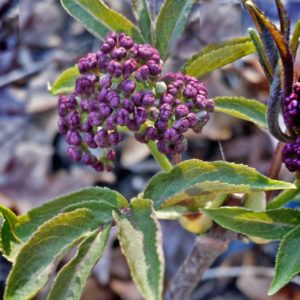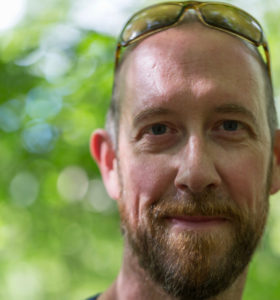
Native red elderberry plant, Sambucus racemosa, showing off its flower buds in the Garden-911 display garden in North Easton, MA. WARNING: Red elderberry fruit, leaves, stems, flowers, roots and other tissue are known to be toxic when taken internally without sufficient preparation. Carol Lundeen and Garden-911 assume no liability if you choose to eat or allow others to eat any part of the plant.
Walking the Garden-911 display garden today, these red elderberry flower buds caught my eye. With the color of deep purple lilacs, these native Sambucus racemosa flower buds, combined with their emerging compound leaves, put a smile on my face and took my mind off everything for a few minutes. Gardens, especially native plant gardens, have long been known to be restorative. If you’re staying at home to ride out the coronavirus, it may be a great time to pause to enjoy spring emerging in your landscape – even if it’s just weeds emerging in last year’s containers, or up through the cracks in a sidewalk.
DESIGN AND CULTIVATION When designing with elderberry, keep in mind that they prefer, and will spread and fruit most robustly, in a sunny exposure. Red elderberry is found on a wide variety of soils but favors deeper, loamy sands and silts and nutrient rich sites with good drainage, ample moisture and a pH of 5.0 to 8.0. It’s best to plant at least two genetically diverse individuals. Before you purchase a plant, always inquire as to how it was grown. Even though you’re purchasing a native plant, it may have been grown in a conventional nursery that uses conventional propagation methods like vegetative cloning, where all plants are genetically identical. It’s best to find a nursery that sells sustainably grown specimens. Grow Native Massachusetts has a terrific resource list of nurseries they recommend.
The dense roots and rhizomes of red elderberry make it useful for soil stabilization and erosion control on moist sites including streambanks. It provides fair to good food and cover for birds plus small and large mammals. Hummingbirds collect nectar from the flowers. The fruit is high in ascorbic acid. Stems, bark, leaves and roots contain cyanide-producing toxins but berries may be consumed as jelly or wine after cooking. This versatile plant can also be used to make dye, insecticide, medicine, and musical instruments. The colorful fruit attracts birds and several cultivars have been developed for ornamental applications.
NATIVE PLANT GEEK INFO Other scientific names include Sambucus callicarpa, Sambucus microbotrys, Sambucus pubens, Sambucus pubens. var. arborescens, Sambucus racemosa var. racemosa, Sambucus racemosa ssp. pubens and Sambucus racemosa var. pubens. Alternate common names include scarlet elder, stinking elderberry, stinking elder, red-berried elder, bunchberry elder, and red elder.


